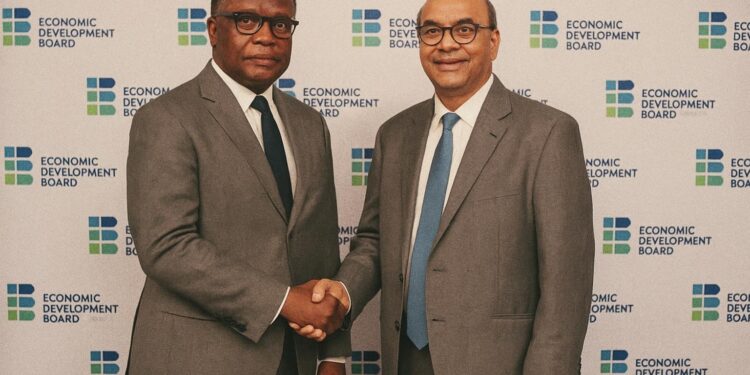Congolese Diplomacy Highlights Port Louis Agenda
A discreet yet symbolically weighty visit to Port-Louis on 24 July has placed Congo-Brazzaville’s economic diplomacy under a sharper regional spotlight. Alain Akouala Atipault, chair of the National Commission for Self-Assessment of the African Peer Review Mechanism, conferred with Sachin Mohabeer, Chief Executive Officer of Mauritius’s Economic Development Board, to examine the contours of a multi-sector partnership. The encounter responded directly to President Denis Sassou Nguesso’s stated doctrine of outward-looking diversification, itself relayed by Prime Minister Anatole Collinet Makosso, who has framed international economic outreach as an instrument of national emergence.
Interfacing Vision 2025 with Continental Frameworks
Brazzaville’s Vision 2025, showcased during the forthcoming Congo Enterprises Fair, aligns methodically with the African Continental Free Trade Area and the AU Agenda 2063, both of which accentuate intra-African value chains (African Union Commission, 2023). In Port-Louis, Akouala Atipault outlined how Congolese clusters in agro-processing, timber transformation and digital services can plug into Mauritius’s sophisticated re-export and financial platforms, thereby marrying land-based resources with insular logistical capacity. Analysts in Addis Ababa interviewed by this magazine point out that such cross-jurisdictional teaming helps smaller African economies negotiate global volatility while retaining policy autonomy.
Complementary Strengths in Finance, Ports and Blue Economy
Mauritius, ranked first in Sub-Saharan Africa on the 2022 Mo Ibrahim governance index for business climate, offers a regulatory ecosystem of double-taxation treaties and captive insurance expertise. For Congo, whose Pointe-Noire port already handles over 50 percent of Central African maritime throughput (UNCTAD, 2022), a structured link with Port-Louis could facilitate multimodal corridors reaching both the Indian and Atlantic Oceans. Officials mentioned preliminary templates for a shared special economic zone model where Mauritian fintech firms would co-incubate Congolese start-ups, thus reinforcing capital mobilisation without excessive sovereign borrowing.
Equally salient is the blue economy chapter. Mauritius’s post-Wakashio ecological remediation has generated know-how in coral restoration and coastal monitoring, competences sought by Congo as it develops the Kouilou-Niari mangrove reserve. A senior Mauritian oceanographer consulted in the margins of the meeting argued that joint research stations could leverage funds from the Global Environment Facility while advancing African scientific diplomacy.
Governance and the African Peer Review Imperative
Akouala Atipault’s dual hat as APRM commissioner positions governance at the forefront of the negotiations. Transparency metrics, he contended, are no longer peripheral but a determinant of cost of capital and investor sentiment. Congo’s recent adoption of an electronic single-window for customs clearance, cited in a June World Bank logistics bulletin, serves as an illustrative benchmark. In Port-Louis the delegation reiterated that congruence with OECD anti-money-laundering standards will anchor any bilateral financial instruments, a point welcomed by Mauritian counterparts eager to fortify their jurisdictional credibility after the 2020 EU listing episode.
South–South Routes to Industrial Diversification
While Northern partners remain consequential, Brazzaville’s calculus increasingly privileges South-South synergies. Congolese trade data indicate that exports to African markets expanded by 18 percent year-on-year in 2023, compared with 4 percent vis-à-vis the EU (CEMAC Secretariat, 2024). In this light, Mauritius supplies a specialised node—neither aid donor nor mere transit hub, but a co-investor skilled in regulatory engineering. That complementarity is set to materialise through blended finance for agri-industrial parks in Ouesso and Loudima, projects which according to Congolese planners could elevate non-oil exports above 20 percent of GDP within a decade.
Voices from Port Louis and Brazzaville
“The architecture of this partnership is predicated on reciprocity, not dependency,” asserted Mohabeer during a brief media interaction at the Port-Louis Waterfront. For his part, Akouala Atipault emphasised that the ‘African enterprise of tomorrow’ will be judged on its capacity to integrate governance, innovation and environmental stewardship in a single proposition. Independent analyst Marie-Claude Moukoulou, reached in Brazzaville, described the dialogue as ‘a calibrated test case for the AfCFTA’s promise of industrial complementation rather than raw commodity flow.’
Prospects for a Sustainable Bilateral Framework
The roadmap sketched in Port-Louis envisages a joint steering committee by year-end, aligning sectoral MoUs with detailed monitoring matrices. Should timelines hold, pilot initiatives in digital payments interoperability and cold-chain logistics could commence in early 2025, dovetailing with the Congo Enterprises Fair. Converging macro-stability—Congo’s inflation now at 3.8 percent and Mauritius’s at 4.1 percent—provides an enabling backdrop, according to IMF regional briefs.
Ultimately, the nascent Congo–Mauritius axis underscores the evolving grammar of African diplomacy: pragmatic, data-driven and consciously multilateral. By leveraging complementary strengths while embedding transparency safeguards, both governments articulate a cooperative template potentially replicable across the continent, and consonant with President Sassou Nguesso’s ambition to situate Congo firmly within Africa’s emergent economic vanguard.












































